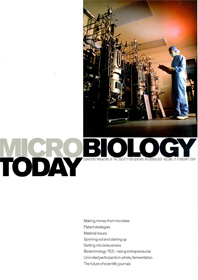Making Money From Microbes
01 February 2004 publication
The lead articles of the February 2004 issue of Microbiology Today are on making money from microbes; patent strategies; material issues; spinning out and starting up; getting into biobusiness; biotechnology YES - being entrepreneurial; uninvited participants in whisky fermentation; and the future of scientific journals.
Making money from microbes (p. 03)
David Onions discusses biotechnology and the commercialisation of microbiology.
Money matters (p. 04)
Coming up with a great discovery is one thing, but financing its development is another matter. Simon Browning sheds some light on ways to fund a new biotechnology venture.
Patent strategies from biotechnology companies (p. 06)
Taking an innovative idea in the field of biotechnology from the lab to the market place is a complex process. Sandy Primrose and Richard Gillard explain how to protect the invention from competitors.
Material Transfer Agreements - 'material' issues (p. 08)
Claudia Riordan explains Material Transfer Agreements.
A strange episode in the history of antibiotics (p. 09)
Michael Carlile reveals the history of a research station.
Getting into biobusiness (p. 12)
Faye Jones gives a brief overview of some of the resources that support innovation and promote enterprise in the UK.
Biotechnology YES (p. 14)
Exploiting microbes can be highly lucrative. John Peberdy describes a scheme to teach young scientists some of the necessary skills to become an entrepreneur.
Lactic acid bacteria - the uninvited but generally welcome participants in malt whisky fermentation (p. 16)
How does malt whisky acquire its unique flavour? Fergus Priest explains how lactobacilli can play a crucial role.
Public affairs (p. 28)
The Society and its members work hard to promote microbiology to government in the UK. This feature covers some interactions with parliamentarians in both Westminster and Scotland.
Gradline (p. 30)
Gradline Editor Jane Westwell looks at one career option in the Civil Service for science graduates.
Open access publishing - is it the future for scientific journals? (p. 31)
Publishing journals is a core activity of the Society and funds many of its charitable activities. But times are changing. Ron Fraser explores the issues facing scientific publishers as they strive to maintain both income and a quality product in the online era.
Schoolzone (p. 32)
Crossing the divide - this issue discusses promoting microbiology in schools.
Obituary (p. 36)
We are sad to announce the death of Dr John Smith.
Comment - are politicians listening? (p. 52)
It is inportant for practitioners to raise the understanding of science by engaging in a dialogue with the general public. But as Peter Cotgreave describes, one important part of the audience, the politicians, may not be listening...
Cover image credit: James Holmes/Celltech Ltd/Science Photo Library

